by Tom Gaylord
Writing as B.B. Pelletier
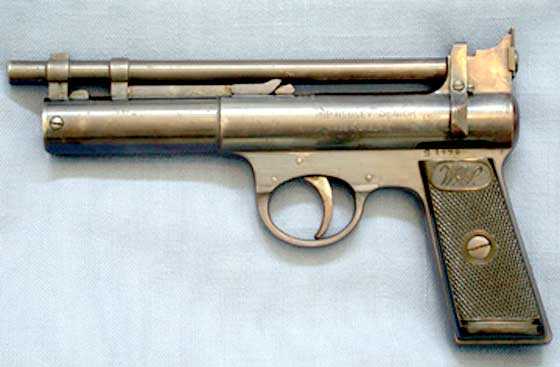
Webley Senior straight grip air pistol.
This report covers:
- Pictures
- Start
- Remove the end cap
- Remove the piston
- The piston
- What now?
- Summary
Today we look inside the Webley Senior air pistol. Let’s get to it!
Pictures
There are a lot of pictures in this report and I didn’t spend much time cleaning them up. They show the details that are important, plus there was one unexpected lesson in photography you will soon see.
Start
We start with the pistol uncocked and unloaded. I first photographed it on a black background that made the dark black gun appear to be silver. So for the first photo of the pistol, I jaid it on a white paper towel, which got it looking dark again.
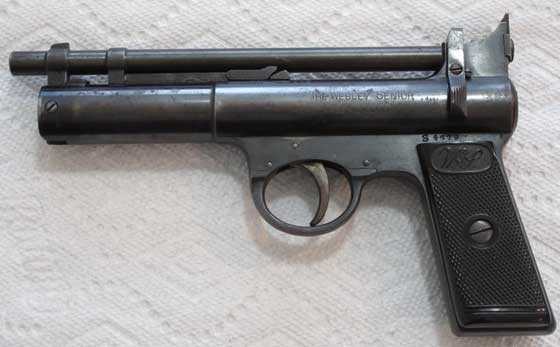
Start with the gun unloaded and uncocked.
Remove the end cap
The first step is to remove the end cap. There are several minor steps involved. First remove the short locking screw on the left side of the gun and the long pivot screw on the right side.
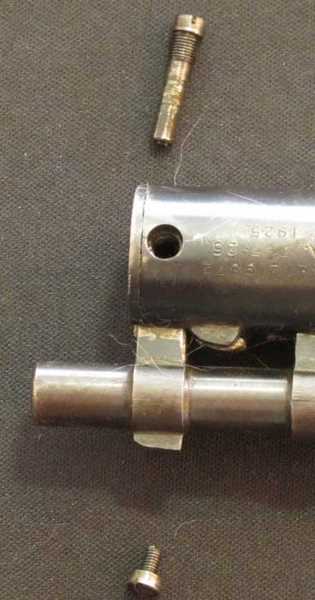
Two screws are removed from the end cap. The bottom screw is on the left side of the gun and comes out first. It threads into the top screw, which is the pivot for the cocking link. Notice the dark gun is now silver against the dark background.
Now release the barrel at the breech. It has to be free for what comes next.
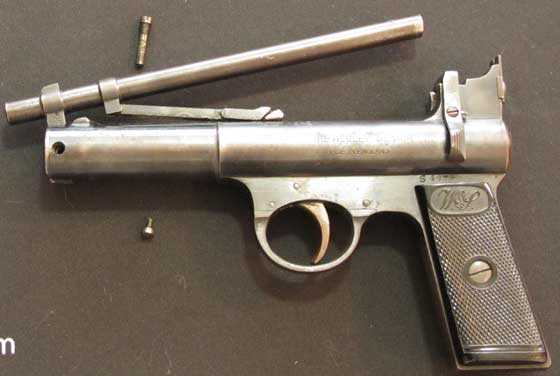
Release the barrel at the breech, as if cocking the pistol.
Now it’s time to lift the barrel lug up out of the end cap. It is very tight, but not an interference fit. It will come out. I use the barrel as a lever and insert a screwdriver shank between the barrel and the gun to lever the lug out. You’ll see what to do if you ever disassemble one of these pistols.
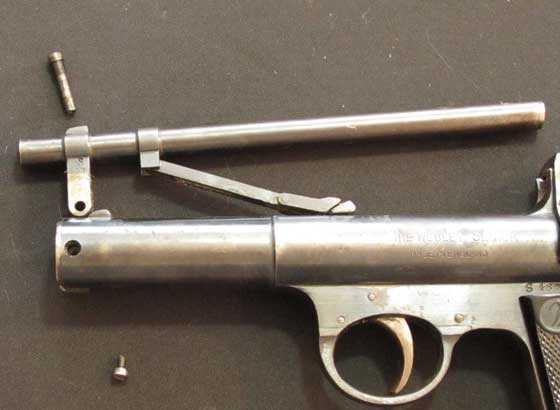
The barrel lug has been pried up out of the end cap. Notice the cocking linkage is still attached to the pistol at the rear.
The lug is out but the barrel isn’t free until you detach the cocking linkage from the pistol. Slide the link backwards towards the breech and it will stop at the disassembly hole. Pull it out and the barrel is free of the gun.
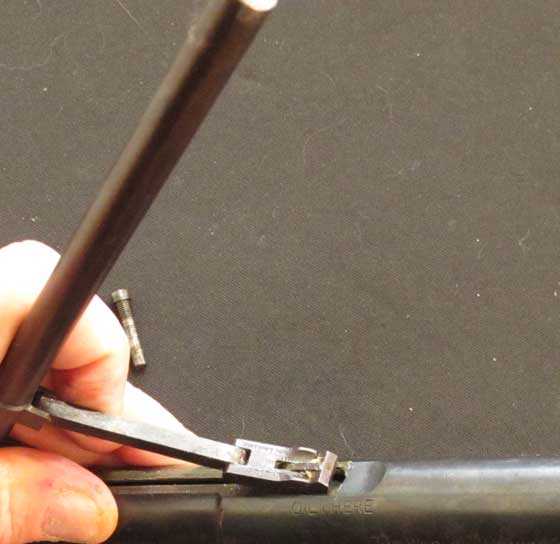
Slide the cocking link to the rear to remove it from the gun.
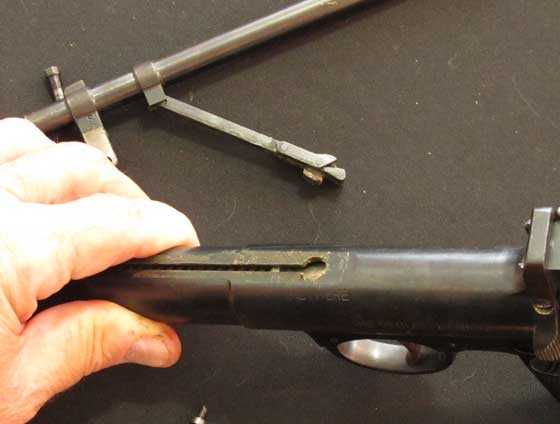
The barrel is free of the pistol.
Now we turn our attention to the end cap. The end cap is threaded, and on a pistol that has not been apart much, it will be very hard to turn. I put something to act as a large screwdriver in the jaws of a vise and I turn the pistol with my hands. The “screwdriver” remains stationary in the end cap slot while I turn the pistol.
After the first disassembly years ago I put grease on the end cap threads so they would always come out easily. I still use the “screwdriver” because the end cap slot is quite wide. A regular screwdriver would just mar it. I cut off one end of an open-end wrench and use the flat section as my “screwdriver.”
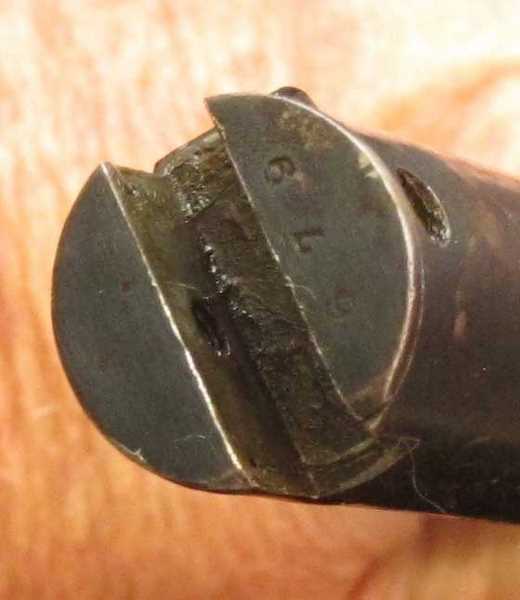
The slot in the end cap where the barrel lug was located is very large. A regular screwdriver would just mar it.
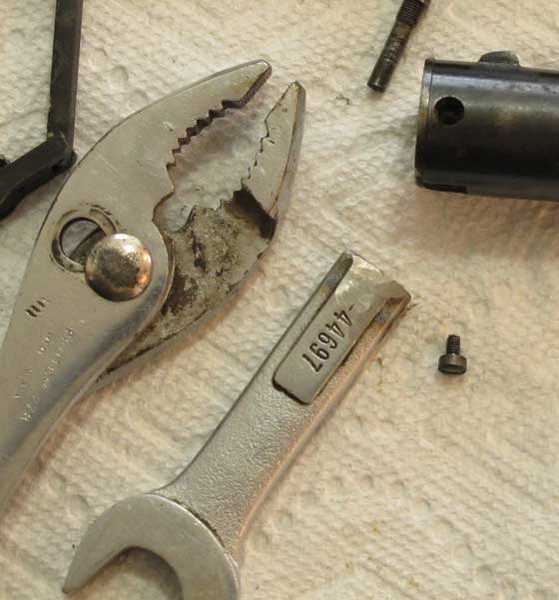
I use the cut-off end of a wrench as a wide screwdriver. Tighten it in a vise. When it’s in the end cap, slot,turn the gun with your hand. Once it is free I start it turning with the pliers. Notice that when the gun is back on the white paper towel, it is dark again.
Now I unscrew the end cap from the gun. I do this by hand, knowing that the mainspring will push the cap about two inches out of the tube when the cap is free. It’s a stout push that you need to be ready for. This would be very difficult to do in a mainspring compressor, but you need to know that spring has a lot of force!
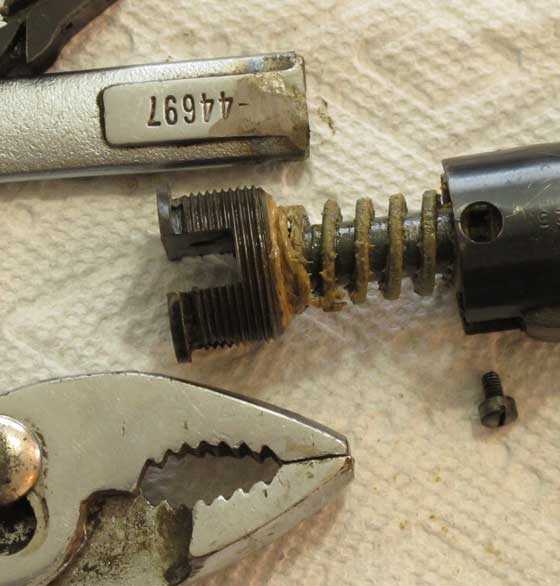
The end cap has been turned all the way out. This is how far the mainspring sticks out when it is not restrained by the end cap.
As you can see, the mainspring and inside of the powerplant are still well-greased. I used surplus military grease that was made to lubricate an M1 Garand, but regular white lithium grease works fine for this. It doesn’t dry out over time. This pistol has been lubricated this way for over 30 years!
Now you can pull the end cap out of the gun. The mainspring should come with it. You will see that the spring guide is a part of the end cap.
Look at the mainspring. Is it reasonably straight or does it have one or more prominent bends? A bent mainspring should be replaced, and they are available from the British parts houses like T.R. Robb and John Knibbs. A new one doesn’t cost much and will change the performance of your pistol noticeably. The spring in my gun has been in there over 30 years and still looks pretty good, because I don’t shoot the gun that much.
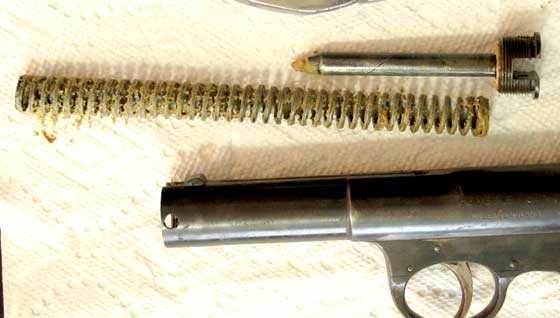
The mainspring looks straight. Now you see that the end cap is also the spring guide.
Remove the piston
That entire procedure was just to remove the end cap. It’s a lot of small steps, but each one is straightforward and not too technical. If you follow my instructions, you should be able to do the same with not just a Webley Senior, but also a Mark I and Mark II, and a Premier Mark I and II. Even the Tempest, Typhoon and Hurricane are pretty much the same, with some modern touches added for lower production costs. All Webley spring pistols are constructed in a similar way.
The next step is actually the final one. The piston has to be removed from the gun.
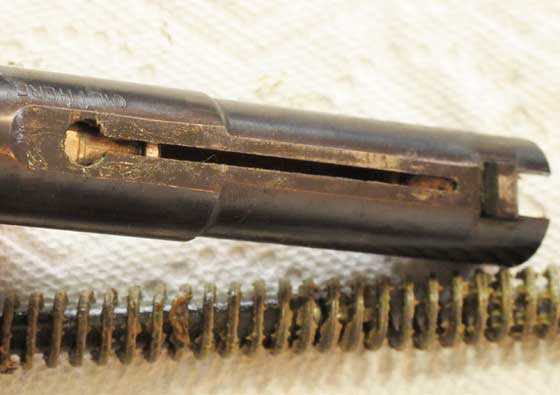
Looking through the cocking slot, you can see the bottom end of the piston.
I will tell you now that the piston will be tight inside your gun. There are two steps to removing the piston. Step one is to use a screwdriver through the cocking slot to push the piston out of the gun. There are many machined surfaces on the piston for the screwdriver to grab. When you get it as far as it will go you have to move to the front and place the screwdriver against other piston surfaces to completely remove the piston from the pistol. The piston is a hollow tube with all its connections to the air pistol machined around the outside, so there are several places to pry on.
The piston will slide a little way then stop on the sear. You have to pull the trigger while sliding the piston to get it past the sear.
It does slide all the way out, and when you put it back you will lubricate the outside with lithium grease thoroughly so there will never again be a problem removing it from the pistol.
The piston
Once the piston is out, you can examine it. Note that there are circular rings at the front and rear that keep the piston aligned with the inside of the spring tube/compression chamber. Most spring-piston airgun pistons have similar design, but few are as sharp and obvious as those on the Webley piston.
You will also be able to see the piston ring when the piston is out of the gun. If it needs replacing, you should be able to see some flaw like a break or a bend. Don’t just replace it for no reason, because these things don’t wear out. The one on my pistol is at least 40 years old and I would not be surprised to learn that it’s original to the gun.
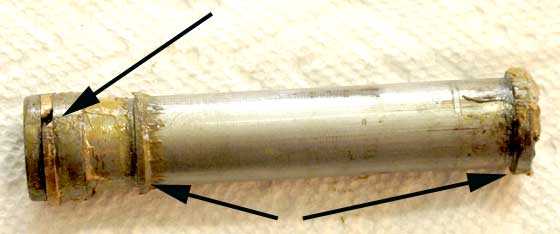
With the piston out of the gun you can see the piston ring (arrow). Notice, also, the rings around the piston (two arrows), front and rear, that guide it inside the spring tube.
What now?
Now that the pistol is disassembled this far, it’s time to clean all the parts and lubricate them as described in this report. Then the gun goes back together in the reverse of how it came apart. There are a few tips you should know.
First — now is when you lubricate all the parts. Use white lithium grease and nothing else, unless you know for a fact it’s better. You can grease the inside of the spring tube/compression chamber, but I find the piston does that when it’s installed. I don’t bother doing it separately.
Second — the piston doesn’t want to go back into the pistol. The piston ring may need to be compressed to get it in the gun. Do this with your fingers, and it should slide into the gun.
Third — when the head of the piston encounters the sear it will stop. You must pull the trigger to get the piston to slide all the way in. Remember that the fit is tight. It will go in, and the lubrication will help you.
Fourth — when you put the end cap back you have to cup it in your hand and be prepared to push against the spring until it encounters the threads. This may take some trying before things line up. Screw it in at least one turn before releasing to adjust your grip to turn it some more, and don’t leave it hanging by a thread! After it is a couple threads in you can use your “screwdriver” to turn it in farther.
Summary
It took me about 45 minutes to disassemble the pistol. That included taking the pictures. I expect the first time you disassemble a Webley pistol it will take a similar amount of time, though once you have lubed it, it should come apart in 15 minutes.
We also learned that you can make airguns appear lighter or darker in photographs, depending on the background they are placed on. Flash doesn’t bring up the details. Flash often turns a dark gun into a black silhouette. Use a tripod and let the camera’s brain figure out the exposure.

B.B.,
Thank you so very much for this series. Your first installment back in June quickly prompted me to get an early slant grip Senior, and it is an incredible pleasure to shoot. My surprise was how much better it shoots than my San Rafael Hurricane (which is just the second air pistol I have ever owned and the pawnshop prize that started my adult interest in airguns).
Air pistols like the Webley Senior will likely never be made again, at least not by a mass producer. Custodianship of one of these, which should long outlive even young owners, let alone an old coot like me, is a privilege.
Thanks again,
Michael
BB,
With this series you have once again managed to stir up my interest in acquiring a Mark 1. That was the pistol my dad gave to me as a kid to play with after he rendered it non firing, or so he thought. It finally disappeared, never to be seen again. It is likely in a land fill somewhere.
I try real hard not to be a collector, but these old air rifles and pistols are so well made and such a joy to shoot. One day my grandson will own some very interesting antiques. I hope by then I will be able to pass on to him just what they are and maybe he will pass them on to his grandson.
B.B.,
That was a real treat to see. Fine job on all the photos as well. I did not expect to see a spring that long come out of a pistol. I was also surprised to see how substantially built the piston is. It is amazing that it is the smooth shooter that you have said that it is. The grease and the front and rear guides no doubt help with that.
I even went back to Parts 1~3 to give myself a quick recap. This has been a fun one to watch. Now you got me wanting to hit up the antique shops and yard sales!
Chris
Hi Chris, BB, and the group. This series has been a real treat for me. I will use it as a reference if I ever have to open up my Turkish made Tempest. The design of these Webleys are timeless. I love the compactness of the Webleys and of course not having to worry about CO2 . I also now will be on the lookout for a vintage Webley, just for the fun of it. Best wishes all.
Harvey
BB,
I have a very nice Premier series F that came from the Clarence White collection via Ron Robinson. I will save your nice instructions. The gun shoots fairly well (as Ron said, it is minute of beer can accuracy) but it is a beauty, in almost as-new condition.
I’ll see you Saturday – will bring some Pelletgages as door prizes.
J
Jerry
Jerry,
Thanks for the gages. I told the show manager to expect them.
See you there! 😉
B.B.
Camera’s do see different than we do don’t they.
And that piston and ring reminds me of the FWB 300.
Do you really want that much lithium grease on the outside of the piston. That’s where the compression has to happen. I just keep picturing a car engine and all that grease packed in the ring grooves. That ring probably wouldn’t seal good.
I crosshatched the cylinder on the 300 and used a drop or two of transmission fluid on the ring. That will lap the ring and cylinder in. Then I would just put a drop or two in the transfer port like after about 2000 shots.
The velocity was much better in the 300 when done that way. I think the light amount of lithium grease on a synthetic piston seal is good. But not on a steel ring.
Just my two cents and the way I do it.
GF1
Was watching drag racing again yesterday . Brittany won her third final this season . Her and Brown both blew their engines, but Britt kept on it all the way to the line .
One happy girl, and one happy family .
tt
TT
Them Forces are like fine made watches. They just keep ticking on.
I didn’t get to see it. I was to involved in shooting that Daisy 74. You ain’t going to believe how many shots went through it this weekend. 1000 smart shot lead bb’s and 1000 Daisy zinc coated bb’s.
You know what I found to be cool also. When I was standing in the shade shooting out at a can in the bright sunlit yard. The bb’s were like tracer rounds. Made it very easy to adjust my hold on the cans. It was almost like the open sights were just there for back up. Was some fun shooting.
GF
Looked like fire, sparks, and molten metal spewing out of the left front corner of the motor . She was not going to get off of it .
Looked like something on the top of Brown’s engine blew .
Slow shiny ammo does show up good, don’t it ?
tt
TT
Yep both daughter’s caught on to that real quick when they was shooting the 74.
I’m glad that somebody knows how to do this. As it turns out, I am in the midst of British manufacturing problems. My load of .303 surplus from WWII was full of hangfires. Apparently this is a common phenomenon, so exercise extreme caution about any sales of this product. Between this and some other reasons, I’m going to do a bit of reloading. But now I find out that Lee-Enfields had some of the widest bore variations of any rifle. It seems that the standard bullet size is around .311. But what happens when you get a smaller bore of .308? I’m assuming that the bullet does not get stuck. Does it get squeezed? Or does it get more deeply cut by the rifling? And are there adverse consequences for the gun or accuracy or the health of the shooter? As another point, is it true that match grade barrels have more grooves than other kinds of barrels? I have a Long Branch No. 4 which I believe has a two groove barrel. If so, that would seem to work against accuracy although apparently the Long Branch rifles had tighter tolerances than those made in England during wartime.
Maybe all of this contributed to a very vivid and bizarre dream I had the other day. It was like the Jack and Jill series gone horribly wrong. I was taking an attractive young pharmacy technician to a range to watch me shoot my M1 Garand. An internet shooting personality named IraqVeteran8888 was there, and he was shooting some kind of combination black powder and air rifle. When my turn came, I discovered to my horror that my clip of rounds was loaded with all kinds of different bullets, some round nose and some pointed. When I fired them off, there was no recoil whatsoever. As I reached the end of my clip, a woman with a pronounced Southern drawl asked, “Are you firing those single shot?” I had to retract the bolt to eject the clip and then I woke up in a cold sweat… There is a psychoanalytic theory that dreams have deep meaning and a more current theory of cognition that dreams are just noise produced when the elements of our mind are not coordinated by conscious thought. I’m hoping the latter is true in this case.
With respect to our past conversation about Bowie knives, I have done some research and found numbers of historical examples from the 19th century that have the classic clip point design, so the legend is true. Also, the rationale for the clip point turns out to be much simpler than I had supposed. It makes the tip thinner for more rapid penetration, a combat attribute. Anyway, I am taking delivery today of a Bowie that is so large that customers laugh out loud when they unwrap it. Can’t wait.
Matt61
Matt61,
Good to hear from you. I was beginning to wonder.
I can easily see your passions getting carried over into your dreams. I must say,…. when you pursue an interest,… you Sir,…. go all the way. I admire that.
Now,…. flash back to the Peanuts. Remember Lucy and her little 5 cent advice stand? That will be 5 cents please! 😉 Ok,….. given inflation and such,….. I will settle for a Buck. 🙂
Good luck on getting it all figured out,…… Chris
Thanks for the concern, but I live a very orderly and safe life. No driving 95 mph down a country road at night or hunting boars with Bowie knives like Buldawg. If I get into my hobbies, it’s not always by choice. I just wanted a good Lee-Enfield, and I sent it to a gunsmith to have it safety checked. Somehow, he screwed up the smooth-sliding bolt which is one of the best features of this rifle. I had to go all the way to South Carolina to find a gunsmith who could fix it. Then, I wanted to set myself up for a long time with a large supply of surplus ammo, but I find this is one type of surplus ammo that has deteriorated. This has forced me into handloading. But now I find that bore sizes vary and the chamber sizes are so large that I have to learn a new process called neck resizing. Argh.
Yes, I remember the Peanuts gag. It also reminds of a Saturday Night Live skit of a woman doing a psychiatric TV program like Dr. Phil. It was called Learning to Feel. Agitated patients come in like this one man and sit down across from the woman who looks severe in a business suit and thick glasses. She says, “Welcome to Learning…To…Feel. How can I help you?” The man says that he is feeling discombobulated and uncertain as if his life is on a rollercoaster, and his voice takes on a hysterical edge. After looking at him for a moment, the woman tells him to look at himself which he does, looking down. Then she says, “You’re not on a roller-coaster.” He agrees. Then his face lights up and he thanks her profusely. There is a joke that “Neurotics build castles in the air. Psychotics live in them. And psychiatrists collect the rent. Anyway, it’s too bad about Saturday Night Live. They used to be really funny, but I don’t know what’s happened to them.
How are you doing on the job front?
Matt61
Matt61,
I think all of us can relate to the phenomenon of getting pulled in deeper and deeper into something and ending up on side tangents,…. just to support the original tangent. Air guns, fire arms, hot rods, home projects, etc..
Yea, dreams can be interesting. As for the job scene,… at near 55,…. options that existed as a young man,.. are not options any more. I am putting myself out there. 1 interview. Plus, not being college educated, that cuts down options. Although,.. a degree is no guarantee either. Then,.. there is what can I settle for dollar wise. Around these parts, 12 is good. 14 is nice and more is,… you are lucky. I was at 18 and could get by on 14,….. so there is all that.
I did talk to my dept. manager yesterday. More bids are out and many are looking real good. We did get awarded 1 for two big buildings with switchgear. So, things are looking up. Contracts the size we deal with take months, if not years to clear all the hurdles. We do the electrical switchgear that makes up the countries, major cities, transportation (elec. rail), etc. systems.
I would not mind a change of venue. We shall see. Doing fine for the foreseeable future. I am single and can live cheap. Thanks for asking.
Chris
matt 61,
crocodile dundee, reaching behind his back, ”
That’s not a knife; THIS is a knife”, uncovering HIS Bowie knife to young punk …
As a matter of fact, that quote has come up frequently in reviews of this knife. And the quote may have deeper historical significance. The fact is that no one knows exactly what kind of knife that James Black made for Jim Bowie that he use in his famous Sandbar fight. Some sketches I’ve seen show a fairly simple blade with no clip point. One of the Bowie brothers is quoted as saying that the clip point design came from “expert cutlers” who produced copies of the knife. It makes sense that a trained knifemaker would call on the tradition of medieval sword blades which have clip points just like the Bowie and were not that much larger. So the link between the Bowie and a sword is not accidental.
Matt61
Matt,
I’ver never heard of a /308 SMLE, but I suppose it could happen. The bull;etv gets squeezed and the pressures rise but the bullets do come out.
Not good for your health if the bolt lets go.
B.B.
Maybe I got the numbers mixed up. It seemed like there were cases of bullets bigger than bores. I’m not sure if they got as small as .308. And I don’t know if they were small enough to be a danger with .311 bullets. I’m banking on the fact that if the .311 was standard, they worked okay with the mass-produced bores of various sizes, so I should be okay. There is always the option of slugging the bore, but that doesn’t sound very easy, so I will probably skip it.
As for the bolt letting go, I’ve also learned that Enfield actions were rated for 25 tons per inch, and standard pressures were about 20 tons. With those rear locking lugs I don’t have quite the cushion of a Mauser action, but it should be enough.
Matt61
Matt61
If you are interested in that type of knives, check out the klewang as used by the Dutch Infantry in Indonesia. It is a marriage of a local knife (the klewang) and a German sable. It was used for close combat in the wood and all other sort of chores (digging, wood chopping) just like the Bowie. The Dutch Army arms masters used to complain that too much of the klewangs were returned broken by this non intended use.
They handle quite well and are superior to most 19th century sables I had in my hands. In close combat I would prefer this to a Bowie.
Regards,
August
BB,
You said that flash does not bring out detail. Did you use a lamp or did you take the photo outside in bright sunlight?
Ton,
No. I allowed the camera to sense how long the shutter had to be open and I had the camera mounted on a tripod. As I recall, it was about 1/30 second with an open shutter.
B.B.
B.B.,
I had my wife, a photographer who has had a number of solo gallery shows of her work, read your comments about photographing this Webley and study the photos.
She says using a “Gray Card” / “Gray Balance Card” for your camera settings would eliminate or at least mitigate your “black-looks silver vs. white background shows less detail” problem. You would get excellent detail, black that looks black, and everything in between would also come out with a more accurate representation.
Michael
Michael,
Please thank your wife for me. My late friend Mac, was the head photographer at the National Archives, and tried to get me to do that for years. I was too lazy or stupid to listen. But now I have it confirmed by a second source. Two witnesses, and all!
Thanks,
B.B.
B.B.,
My wife says she is glad she could provide the necessary nudge. She also has additional advice. After you get your gray card, go to an art or hobby supply store and buy some large gray poster board that is a match for the gray of the card. She did that for when she takes photos of something large and/or at a distance.
Mac was head photog at the National Archives! That is quite impressive. I already had been impressed many times by his marksmanship, now I have that to add. Even though I never knew him, I miss him. The good often do indeed die young.
Michael
Hi BB
Yesterday Sunday was one of the nicest range days I have had here in a long time. I spent the whole afternoon on my range down in the creek bottom with temperatures in the low 80’s and absolutely no wind. I was shooting my Gletcher M1944 BB gun and once again it proved to be a gem.
Later in the evening I decided to document the M1944 on my 60 yard range near the house so here goes:
About 7:00PM,Temp 80F and telltales barely moving (2 to 3 kph from the right) I chronyed on a fresh co2 cartridge and saw the following velocities. BB’s used were Daisy Avanti Ground Shot.
Shot 1 – 530fps
Shot 2 – 532fps
Stepping down evenly to –
Shot 40 – 488fps
So probably will see 20 – 25 full power shots.
Next I shot the following 8 shot groups on painted steel targets. Steel BB’s are easy to score because they leave little dimples with easy to measure centers. The wind was picking up (3 to 4 kph) and a bit fickle coming from all over the place.
10 yards 3/4″ ctc
20 yards 1 5/8″ ctc
30 yards 1 7/8″ ctc
When I moved out to 40 yards the wind picked up to about 6 to 10 kph from the right. The telltales were all over the place and I decided to wait and see if the wind would die down. It did eventually and I shot the following with the wind picking up after 5 shots so only a group of 5/8. The last 3 shots were completely off target.
40 yards – 2 7/8″ ctc.
The light was beguining to fail and the M1944 iron sights were getting harder and harder to use so I called it quits for the evening. On my creek bottom range with no wind I know I can hit 45 and possibly 50 yard 6″ targets without any problem.
I think this proves that steel BB’s have a difficult time handling any kind of cross wind or the fickle winds that my telltales were showing this evening. It doesn’t take much air movement to affect a 5.1gn projectile.
I’m curious to hear yours and Gunfun1’s impressions of this little exercise.
Cheers
Dave
Redrafter,
Those are some impressive yardages. (I admire that). Not too many people would even attempt such. I am always pushing my air gun’s limits too,… so I can relate.
Dave,
You certainly put in the time with that BB gun. I have not heard of shooting to that distance with a BB gun before.
As for movement in the wind, both the weight and the low velocity are what is killing you.
B.B.
Dave
That’s nice. I tell ya. I never been one for bb’s. Even as a kid I shot pellets or .22 rimfire. The Daisy 74 has really opened my eyes to what a bb can do if you push it. Well this particular one anyway. I don’t know if I got lucky with this one or what. But it performs. I ordered another 74 and it should be here Thursday. So we’ll see if I just got lucky on the first one or if the 74’s really do shoot as good as the one I have.
I noticed over the week end that the bb’s do get pushed around pretty easy with the wind. Which I figured was going to happen. I like to shoot heavier pellets also.
But I have been shooting the copper coated Smart Shot lead bb’s in the 74 also. They do shoot a little better at the longer distances (20 yards) that I have been shooting at. But the weight makes them start falling off more as the co2 gets lower so less shots per cartridge.
But that’s the problem with where I’m at now. It’s open rolling fields and woods that alternate back and forth. The wind is always blowing from some direction out here. If I get a north or west wind then it pretty well blocks the wind. Only had the 74 this last weekend and I did have about a 8 mph crosswind both days. So I’m waiting for one of those calm north wind days to see what it will do at some longer distances. I’ll probably bench rest it when I do that. Which I haven’t done yet.
But yep like you I intend to push it to see how far and what size targets it will hit at the farther distances. I like doing that I think more than I like shooting groups.